Joshua 5 meaning explained in AI Summary
The Conquest of Jericho: After the circumcision and the Passover, Joshua and the Israelites prepare to attack Jericho. Jericho is a fortified city, and it is the first major obstacle that the Israelites face in the Promised Land. God gives Joshua a detailed plan for attacking Jericho. The Israelites are to march around the city once a day for six days. On the seventh day, they are to march around the city seven times. On the seventh time around, the priests are to blow their trumpets, and the people are to shout. When they do, the walls of Jericho will collapse. Joshua follows God's plan, and the Israelites march around Jericho for six days. On the seventh day, they march around the city seven times. On the seventh time around, the priests blow their trumpets, and the people shout. The walls of Jericho collapse, and the Israelites enter the city and conquer it. The conquest of Jericho is a miraculous event that demonstrates God's power and faithfulness. It is a sign that God is with the Israelites and that he will lead them to victory in the Promised Land.
Chapter 5 marks a turning point in the book of Joshua. The Israelites, having crossed the Jordan, are now firmly established in the Promised Land and ready to conquer it.
1. Fear and Circumcision (v. 1-9):
- The news of the Israelite crossing and Jericho's closed gates terrifies the Canaanite kings.
- At God's command, Joshua circumcises all the Israelite males born in the wilderness. This act signifies a new generation, free from the stain of disobedience that kept their parents wandering for 40 years.
- The "reproach of Egypt" is rolled away, signifying a fresh start and a renewed covenant with God.
2. Passover and Manna (v. 10-12):
- The Israelites celebrate Passover, a reminder of God's deliverance from Egypt, on the plains of Jericho.
- The next day, the miraculous manna that sustained them in the wilderness ceases. They eat the produce of the land, signifying their dependence on God's provision in this new chapter.
3. The Commander of the Lord's Army (v. 13-15):
- In a powerful theophany, Joshua encounters the "commander of the Lord's army," a divine figure who appears as a man with a drawn sword.
- Joshua falls down to worship, recognizing the figure's authority.
- The commander instructs Joshua to remove his sandals, for the ground is holy, echoing God's appearance to Moses at the burning bush. This encounter reaffirms God's presence and leadership in the coming battles.
Overall, Chapter 5 serves as a bridge between the Israelites' past and their future. It marks the end of their wilderness wanderings and the beginning of their conquest of Canaan. The chapter emphasizes God's faithfulness, power, and continued presence as they prepare for the challenges ahead.
Joshua 5 bible study ai commentary
Joshua chapter 5 details Israel’s spiritual preparation for the conquest of Canaan, transitioning them from a wilderness people into a consecrated army for God. Immediately after crossing the Jordan, the new generation of Israelite men is circumcised, renewing the covenant sign. They then celebrate their first Passover in the Promised Land, marking a remembrance of their initial redemption as they embark on a new phase of fulfillment. The miraculous manna ceases, signifying a shift from supernatural wilderness provision to sustenance from the land God has given them. The chapter culminates in Joshua’s encounter with the Commander of the LORD’s army, who reveals that the upcoming battle is not Israel’s but God’s, demanding total submission and re-framing the conquest as a divine, holy war.
Joshua 5 Context
The events of Joshua 5 occur at a pivotal moment. The generation that rebelled at Kadesh-barnea has died in the wilderness, and a new generation now stands in the Promised Land. The miraculous crossing of the Jordan has just demonstrated God's power to both Israel and their enemies. In this context, circumcision and Passover are not mere rituals; they are acts of national identity, faith, and consecration. Circumcision was the physical sign of the Abrahamic covenant, which this new generation had not received. Passover was the memorial of their redemption. By pausing to perform these rites before any military engagement, Israel demonstrates that their success depends on their covenant faithfulness to Yahweh, not on military strategy. This stands in stark contrast to the surrounding Canaanite cultures, which relied on their own pantheons of gods and military might for victory.
Joshua 5:1
As soon as all the kings of the Amorites who were beyond the Jordan to the west, and all the kings of the Canaanites who were by the sea, heard that the LORD had dried up the waters of the Jordan for the people of Israel until they had crossed over, their hearts melted and there was no longer any spirit in them because of the people of Israel.
In-depth-analysis
- This verse serves as a concluding report on the Jordan crossing, showing its immediate psychological impact on the inhabitants of Canaan.
- Hearts melted: A common biblical idiom for extreme fear and loss of courage. Their confidence, likely rooted in the Jordan as a natural defense barrier, is shattered.
- Spirit (rûaḥ): This word means 'breath', 'wind', or 'spirit'. Its absence here signifies a complete loss of morale, courage, and the will to fight.
- The fear is explicitly attributed to what the LORD had done, not just what Israel did. This establishes that God is the primary agent in the conquest, fighting for Israel. The Canaanites recognize the divine power behind Israel's advance.
Bible references
- Exo 15:15-16: '...the chiefs of Edom are dismayed... all the inhabitants of Canaan have melted away. Terror and dread fall upon them...' (Echoes the Song of Moses, a prophetic fulfillment of the fear that would grip Canaan).
- Jos 2:11: 'And as soon as we heard it, our hearts melted, and there was no spirit left in any man because of you...' (Rahab's testimony confirms the widespread fear preceding Israel's arrival).
- Rev 6:15-16: 'Then the kings of the earth... hid themselves in the caves and among the rocks... calling to the mountains and rocks, “Fall on us...”' (Illustrates the terror of God's judgment on his enemies).
Cross references
Deu 2:25 (God putting dread); 1 Sam 14:15 (panic from God); 2 Ki 7:6-7 (Lord causing phantom army); Isa 13:7 (hearts melting at judgment).
Joshua 5:2-3
At that time the LORD said to Joshua, “Make flint knives and circumcise the sons of Israel a second time.” So Joshua made flint knives and circumcised the sons of Israel at Gibeath-haaraloth.
In-depth-analysis
- At that time: A specific command for a specific moment. After the morale of the enemy is broken, God turns to the spiritual state of His own people. Consecration precedes conflict.
- Flint knives: Using flint (ṣûr) instead of metal (readily available Bronze Age technology) connects this ceremony to an ancient, foundational practice. It harkens back to the patriarchal era and the circumcision performed by Zipporah on Moses's son, establishing a link to the very beginnings of their national covenant relationship.
- Circumcise... a second time: This doesn't mean re-circumcising individuals. It refers to a second national event of circumcision, the first being for the generation that left Egypt. This is a covenant renewal for the new generation born in the wilderness.
- Gibeath-haaraloth: Translates to "the Hill of the Foreskins." The place is named after the event, creating a permanent memorial of this act of national consecration.
Bible references
- Gen 17:10-11: 'This is my covenant, which you shall keep... Every male among you shall be circumcised... it shall be a sign of the covenant between me and you.' (The basis for the command, fulfilling the covenant sign).
- Exo 4:25: 'Then Zipporah took a flint and cut off her son's foreskin...' (Shows the precedent for using flint knives in this sacred rite).
- Col 2:11: 'In him also you were circumcised with a circumcision made without hands, by putting off the body of the flesh, by the circumcision of Christ.' (The NT fulfillment of circumcision as an inward, spiritual reality).
Cross references
Gen 34:14-15 (circumcision as identity); Lev 12:3 (Law of circumcision); Rom 2:29 (inward circumcision); Php 3:3 (true circumcision is of the spirit).
Joshua 5:4-7
And this is the reason why Joshua circumcised them: all the people who came out of Egypt, who were males, all the men of war, had died in the wilderness on the way after they had come out of Egypt. Though all the people who came out had been circumcised, yet all the people who were born on the way in the wilderness after they had come out of Egypt had not been circumcised. For the people of Israel walked forty years in the wilderness, until all the nation, the men of war who came out of Egypt, perished, because they did not obey the voice of the LORD... But their children, whom he raised up in their place, Joshua circumcised.
In-depth-analysis
- This section explains the historical gap. The generation of the exodus, though circumcised, was disqualified by rebellion.
- The 40 years of wandering was a period of judgment and covenant suspension. The failure to circumcise the children born during this time was a sign of their disinherited state. They were a people under penalty, not fully enjoying the blessings and responsibilities of the covenant.
- The focus on "men of war" dying highlights the transfer of the commission to a new, consecrated generation. The old army failed through disobedience; the new one will succeed through faithfulness.
- God raising up their children shows his faithfulness to the covenant despite the faithlessness of a generation. He preserves a people for His promise.
Bible references
- Num 14:29: 'your dead bodies shall fall in this wilderness, and of all your number, numbered from twenty years old and upward, who have grumbled against me.' (The decree of judgment being fulfilled).
- Deu 2:14-16: '...until the whole generation, the men of war, had perished... Moreover, the hand of the LORD was against them...' (Reiterates the reason for the 40-year wandering and death of the rebellious generation).
- Heb 3:17-19: 'And with whom was he provoked for forty years? Was it not with those who sinned, whose bodies fell in the wilderness? ...So we see that they were unable to enter because of unbelief.' (The NT theological explanation for the failure of the first generation).
Cross references
Psa 95:10-11 (God's anger at that generation); 1 Cor 10:5 (God displeased); Jer 9:25-26 (punishment for uncircumcised heart).
Joshua 5:8-9
When the circumcising of the whole nation was finished, they remained in their places in the camp until they were healed. And the LORD said to Joshua, “Today I have rolled away the reproach of Egypt from you.” And so the name of that place is called Gilgal to this day.
In-depth-analysis
- Israel is now militarily vulnerable, as the men are healing. This act demonstrates profound trust in God for protection. Their spiritual readiness is prioritized over tactical advantage.
- Reproach of Egypt (ḥerpat miṣrayim): This is a key phrase with multiple layers of meaning:
- The shame of their slavery in Egypt.
- Their uncircumcised state, like the Egyptians.
- The taunt of the Egyptians that God brought them into the wilderness only to kill them (Exo 32:12, Num 14:13-16). Their entry into Canaan disproves this.
- The shame of their parents' rebellion and sin.
- Gilgal: This name sounds like the Hebrew verb galal, meaning "to roll." God provides a tangible, geographical name to memorialize a spiritual reality: the "rolling away" of their national shame and their full restoration as His covenant people.
Bible references
- Gen 34:14: '...we cannot do this thing, to give our sister to one who is uncircumcised, for that would be a disgrace to us.' (Shows circumcision was a defining mark separating them from others, and being uncircumcised was a reproach).
- Eze 20:7-8: '...and cast away the detestable things... but they rebelled against me... in the land of Egypt.' (Highlights the spiritual reproach of Egypt's idolatry that clung to Israel).
- 1 Pet 4:4: '...they are surprised when you do not join them in the same flood of debauchery, and they malign you...' (The concept of reproach for believers being set apart from the world).
Cross references
Deu 9:4-5 (righteousness is from God); Isa 25:8 (he will swallow up the reproach of his people); Mic 7:10 (shame on enemies).
Joshua 5:10-12
While the people of Israel were encamped at Gilgal, they kept the Passover on the fourteenth day of the month in the evening on the plains of Jericho. And the day after the Passover, on that very day, they ate of the produce of the land, unleavened cakes and parched grain. And the manna ceased the day after they ate of the produce of the land. And there was no longer manna for the people of Israel, but they ate of the fruit of the land of Canaan that year.
In-depth-analysis
- Kept the Passover: The first act after their covenant renewal (circumcision) is to remember their foundational redemptive event. It links their freedom from Egypt with their entry into the promised land.
- Ate of the produce of the land: This is a major theological transition point. They are now partaking directly in the promise made to Abraham. God's provision shifts from the supernatural (manna) to the natural means of the blessed land.
- Manna ceased: The timing is precise. The ceasing of manna on the exact day after they ate the land's produce demonstrated that both were from God. He is the source of all provision, whether miraculous or agricultural. This weaned them from dependency on daily miracles to trusting in God's faithful provision through the land.
Polemics
This event serves as a polemic against Canaanite fertility gods like Baal, who were believed to control the rain and harvests. Israel’s first meal comes not from appealing to Baal, but as a direct provision from Yahweh, who gave them the land itself. Their sustenance is a result of covenant faithfulness, not pagan ritual.
Bible references
- Exo 12:26-27: 'And when your children say to you, ‘What do you mean by this service?’ you shall say, ‘It is the sacrifice of the LORD’s Passover...' (The purpose of Passover is remembrance and instruction).
- Exo 16:35: 'The people of Israel ate the manna forty years, till they came to a habitable land...' (Fulfillment of the prophesied end of manna).
- 2 Cor 5:7: '(for we walk by faith, not by sight).' (The transition from manna (sight) to produce (faith in future harvests) reflects a maturation of faith).
Cross references
Num 9:5 (Passover in wilderness); Deu 8:3 (man does not live by bread alone); Mat 4:4 (Jesus quoting Deut 8); Joh 6:49-51 (Jesus as the true bread from heaven).
Joshua 5:13-15
When Joshua was by Jericho, he lifted up his eyes and looked, and behold, a man was standing before him with his drawn sword in his hand. And Joshua went to him and said to him, “Are you for us, or for our adversaries?” And he said, “No; but I am the commander of the army of the LORD. Now I have come.” And Joshua fell on his face to the earth and worshiped and said to him, “What does my lord say to his servant?” And the commander of the LORD's army said to Joshua, “Take off your sandals from your feet, for the place where you are standing is holy.” And Joshua did so.
In-depth-analysis
- A man... with his drawn sword: This figure is a divine warrior, ready for battle. His presence signifies that the real battle is a heavenly one.
- Are you for us, or for our adversaries?: Joshua’s question is natural but mistaken. He views the conflict in purely human, earthly terms.
- No: The Commander's response is jarring and theologically profound. He rejects Joshua's binary choice. He is not a subordinate to be conscripted to Israel’s cause. The real question is not whether God is on Israel's side, but whether Israel is on God's side. It subordinates Joshua and the entire nation to a higher, divine command.
- Commander of the army of the LORD (śar-ṣĕbā’-YHWH): He leads the heavenly host (the armies of heaven). This frames the conquest of Jericho and Canaan not as an Israelite military campaign, but as an act of divine judgment executed by God's own angelic forces, with Israel as the earthly instrument.
- Joshua fell... and worshiped: Joshua immediately recognizes the divine nature of this being and responds with humility and worship, a response appropriate only for God.
- Take off your sandals... the place... is holy: This directly parallels God's command to Moses at the burning bush. It is a divine commissioning. It elevates Joshua to the same level of authority as Moses and establishes that this 'holy war' is initiated on holy ground by God Himself. Many scholars see this commander as a Christophany—a pre-incarnate appearance of Jesus Christ.
Bible references
- Exo 3:5: 'Then he said, “Do not come near; take your sandals off your feet, for the place on which you are standing is holy ground.”' (The direct parallel establishing Joshua as Moses' successor).
- Dan 10:13, 21: 'The prince of the kingdom of Persia withstood me... but Michael, one of the chief princes, came to help me...' (Reveals the reality of spiritual warfare with angelic commanders like Michael).
- Rev 19:11-14: 'Then I saw heaven opened, and behold, a white horse! The one sitting on it is called Faithful and True, and in righteousness he judges and makes war... and the armies of heaven, arrayed in fine linen... were following him.' (The ultimate depiction of Christ as the commander of heaven's armies).
Cross references
Gen 32:24-30 (Jacob wrestling a divine man); Num 22:31 (Balaam seeing the angel of the LORD with a drawn sword); Judg 13:17-20 (Manoah's encounter with the angel of the LORD); 2 Ki 6:17 (Elisha revealing the heavenly army).
Joshua Chapter 5 Analysis
- Chiastic Structure: Chapter 5 can be seen as having a chiastic (inverted parallel) structure that centers on the Passover celebration:
- A. Outside view: Canaanite kings fear Israel (v. 1)
- B. Internal Action: Circumcision and rolling away of reproach (vv. 2-9)
- C. Central Act: Passover Celebration (vv. 10-11)
- B'. Internal Result: Manna ceases, provision of the land begins (v. 12)
- B. Internal Action: Circumcision and rolling away of reproach (vv. 2-9)
- A'. Outside (divine) view: Commander of the Lord's army appears to Joshua (vv. 13-15)
- A. Outside view: Canaanite kings fear Israel (v. 1)
- Theological Progression: The chapter demonstrates a clear spiritual progression required before conquest: 1. God inspires fear in the enemy. 2. Israel renews its covenant identity (circumcision). 3. Israel remembers its redemption (Passover). 4. Israel accepts God's new provision (produce, not manna). 5. Israel submits to God's divine command and leadership (Commander of the Lord's army). Battle can only begin after these spiritual preparations are complete.
- From Promise to Fulfillment: Joshua 5 is the hinge point between the promise and its fulfillment. The manna of the wilderness (promise period) gives way to the fruit of Canaan (fulfillment period). The Passover, which looked back to Egypt, is now celebrated looking forward to the conquest.
- Joshua as the New Moses: The final scene explicitly parallels Joshua's commissioning with that of Moses. The holy ground experience legitimizes Joshua's leadership and confirms that the same God who was with Moses at the Red Sea is with Joshua at the Jordan.
- Polemical Purpose: The entire chapter implicitly argues that Yahweh, not the Canaanite gods, gives fertility (the produce of the land) and victory in battle (the Commander). Faithfulness to Yahweh's covenant is the key to life and success in the land.
Joshua 5 Summary
Chapter 5 serves as a spiritual crucible for Israel before they begin their conquest. God first paralyzes Israel's enemies with fear. Then, He commands Joshua to circumcise the new generation, renewing the Abrahamic covenant and "rolling away the reproach of Egypt" at a place named Gilgal. Following this, the nation celebrates Passover in the Promised Land, after which the supernatural manna ceases and they begin to eat the produce of Canaan. Finally, Joshua is confronted by the "Commander of the army of the LORD," who reveals that the upcoming war belongs to God, demanding total submission from Joshua and establishing the campaign as a holy war under divine command.
Joshua 5 AI Image Audio and Video
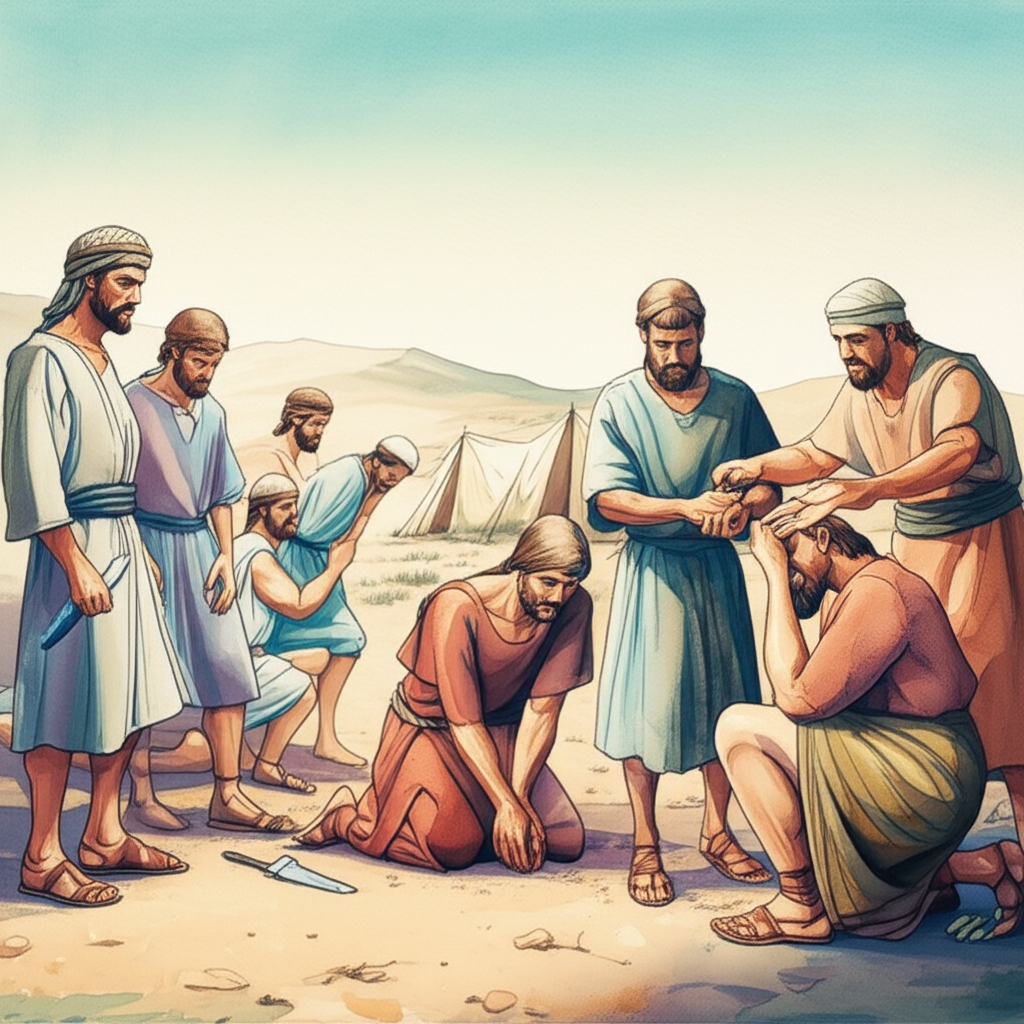
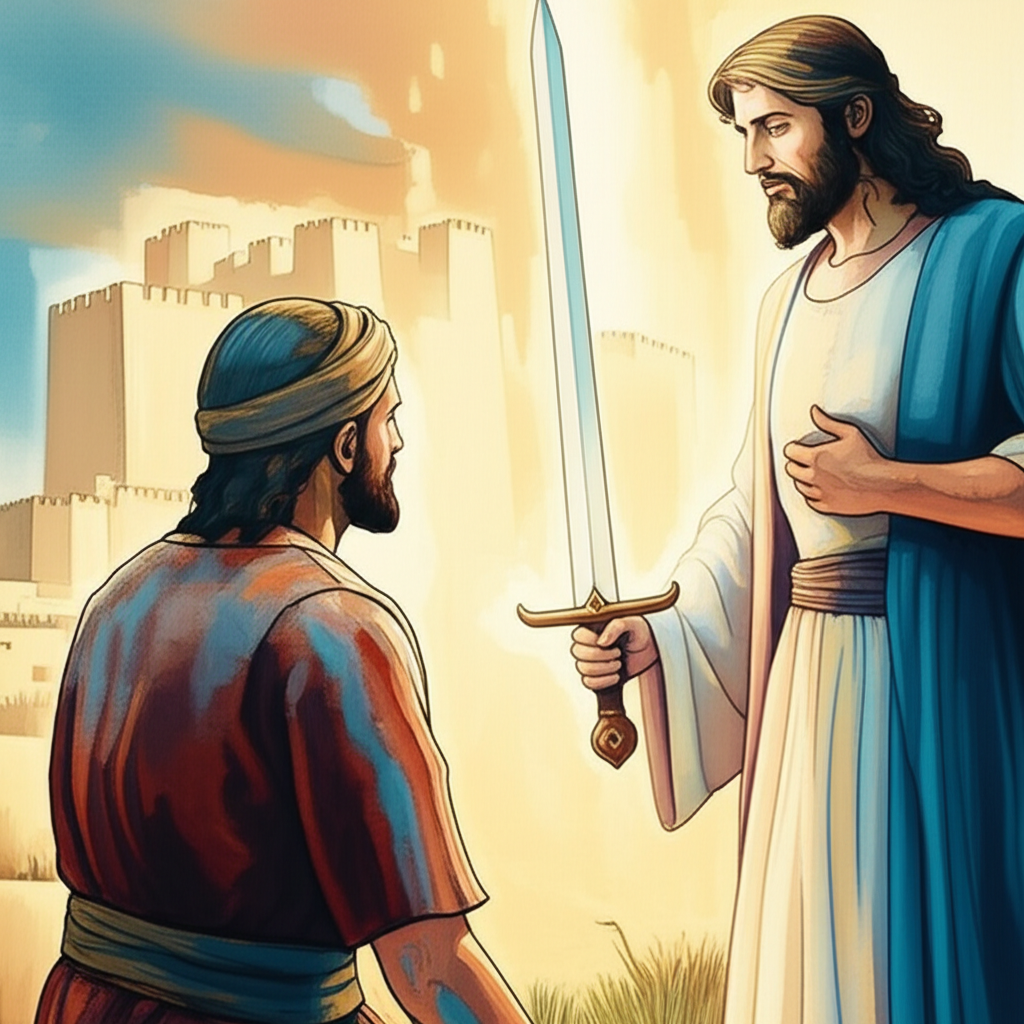
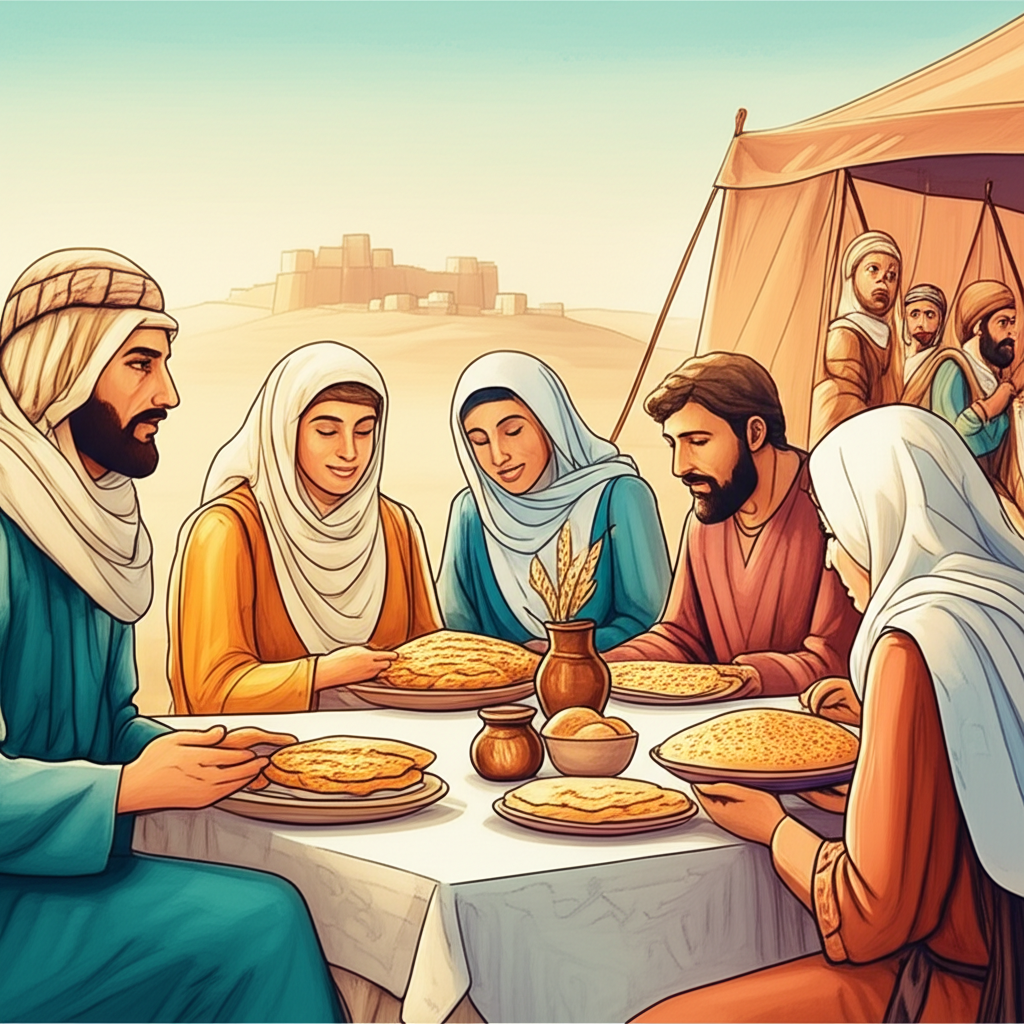
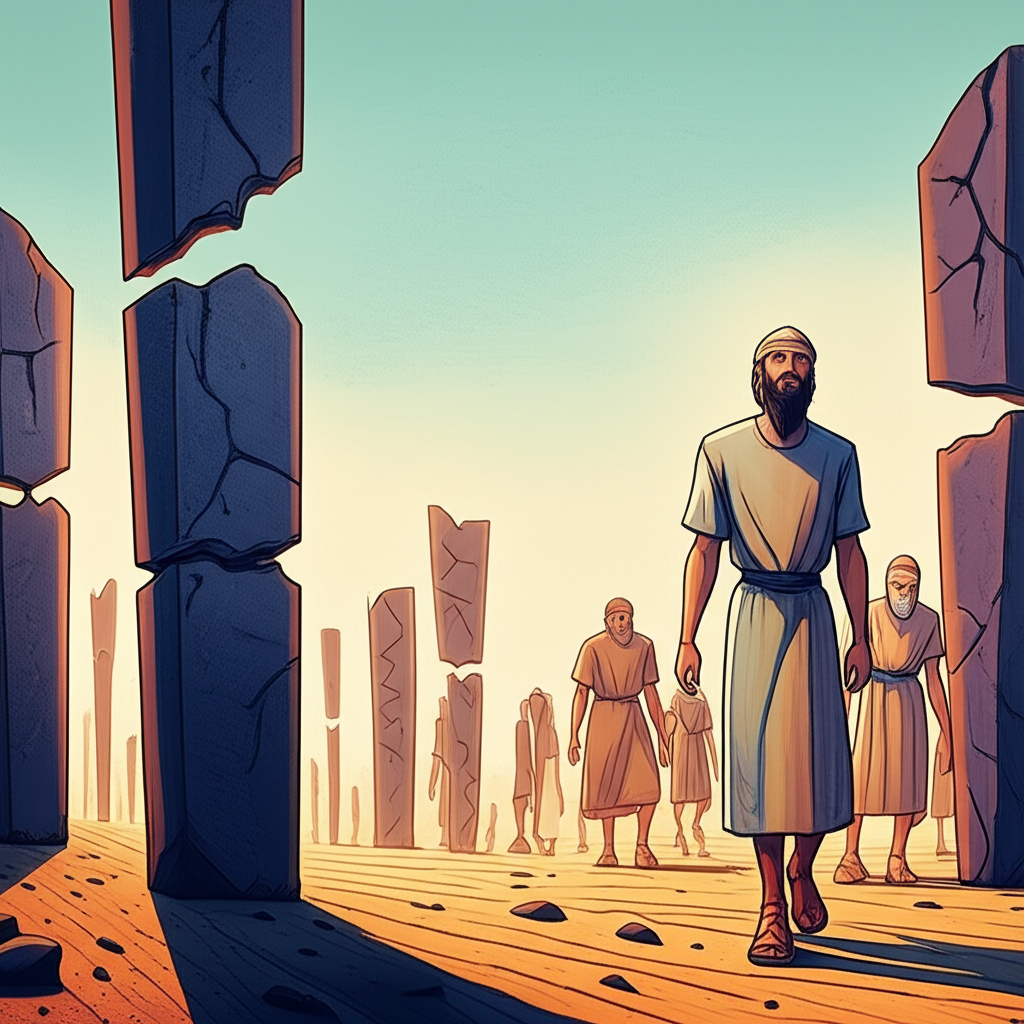

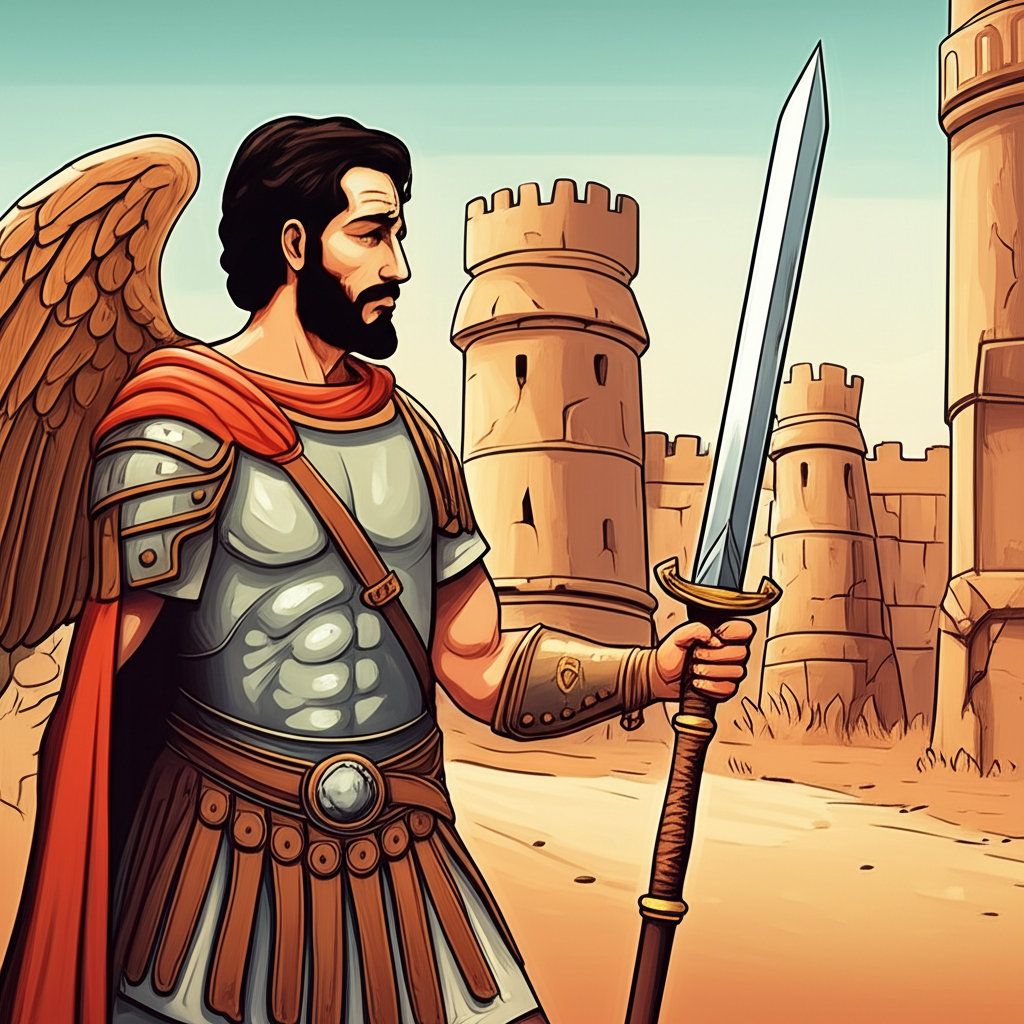

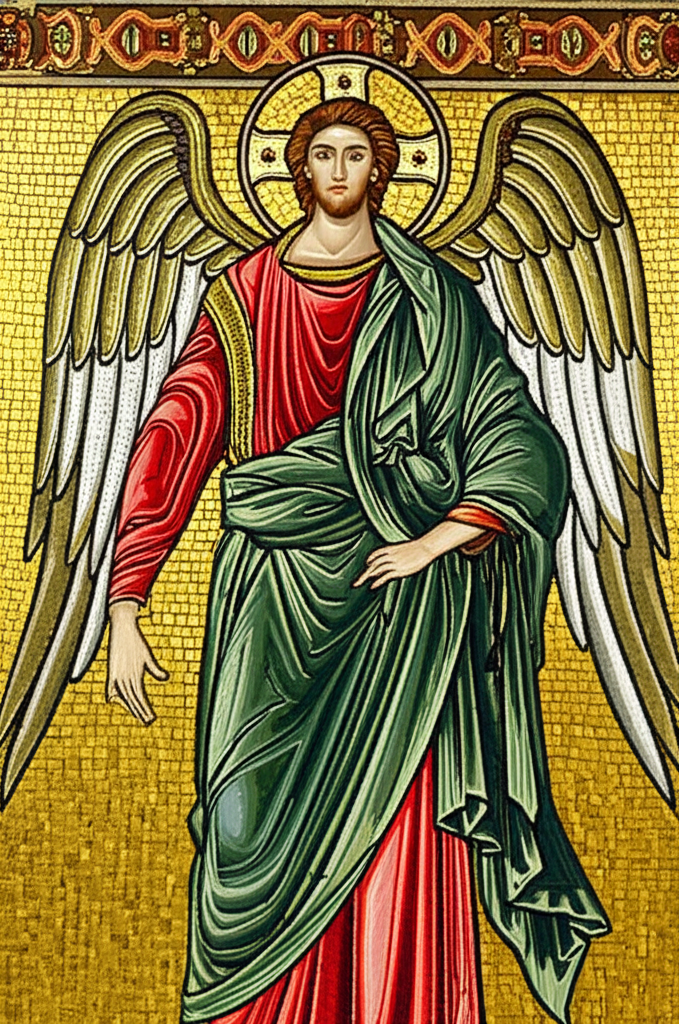
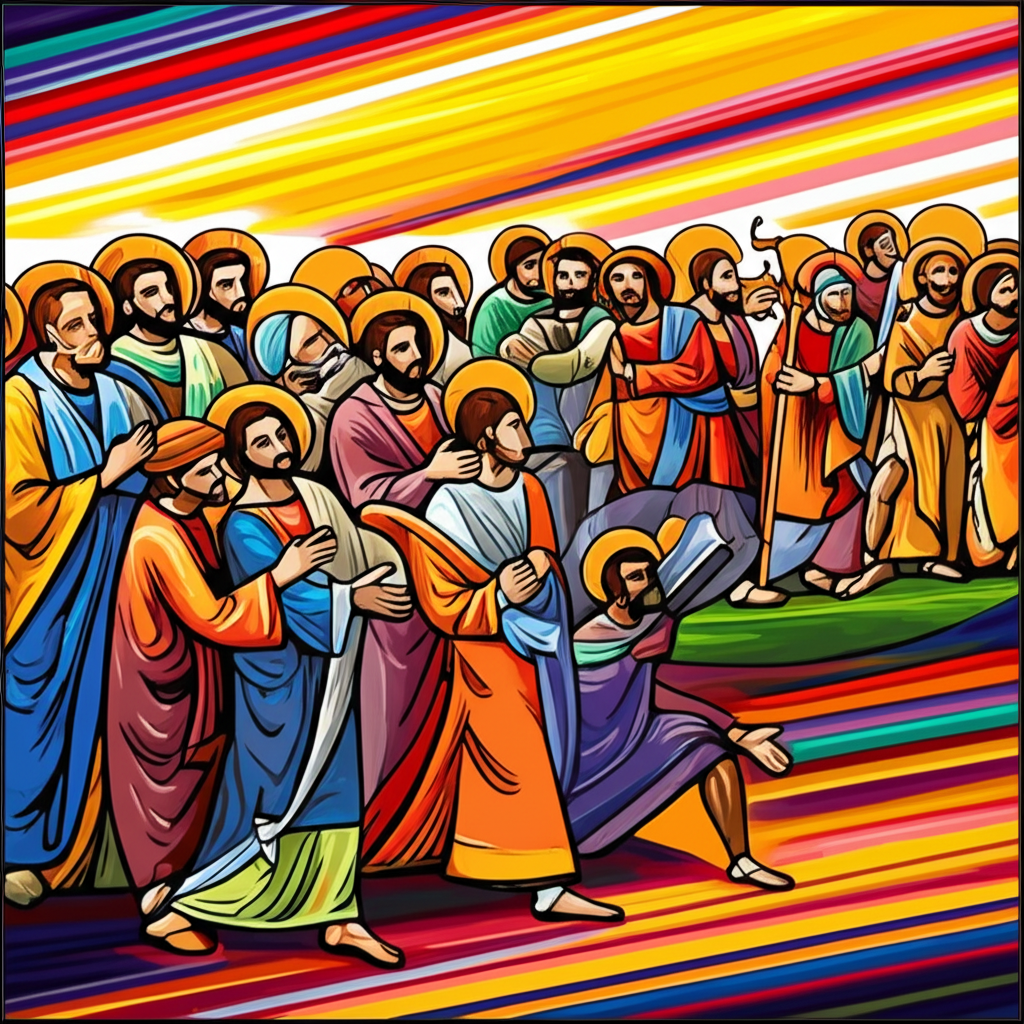
Joshua chapter 5 kjv
- 1 And it came to pass, when all the kings of the Amorites, which were on the side of Jordan westward, and all the kings of the Canaanites, which were by the sea, heard that the LORD had dried up the waters of Jordan from before the children of Israel, until we were passed over, that their heart melted, neither was there spirit in them any more, because of the children of Israel.
- 2 At that time the LORD said unto Joshua, Make thee sharp knives, and circumcise again the children of Israel the second time.
- 3 And Joshua made him sharp knives, and circumcised the children of Israel at the hill of the foreskins.
- 4 And this is the cause why Joshua did circumcise: All the people that came out of Egypt, that were males, even all the men of war, died in the wilderness by the way, after they came out of Egypt.
- 5 Now all the people that came out were circumcised: but all the people that were born in the wilderness by the way as they came forth out of Egypt, them they had not circumcised.
- 6 For the children of Israel walked forty years in the wilderness, till all the people that were men of war, which came out of Egypt, were consumed, because they obeyed not the voice of the LORD: unto whom the LORD sware that he would not show them the land, which the LORD sware unto their fathers that he would give us, a land that floweth with milk and honey.
- 7 And their children, whom he raised up in their stead, them Joshua circumcised: for they were uncircumcised, because they had not circumcised them by the way.
- 8 And it came to pass, when they had done circumcising all the people, that they abode in their places in the camp, till they were whole.
- 9 And the LORD said unto Joshua, This day have I rolled away the reproach of Egypt from off you. Wherefore the name of the place is called Gilgal unto this day.
- 10 And the children of Israel encamped in Gilgal, and kept the passover on the fourteenth day of the month at even in the plains of Jericho.
- 11 And they did eat of the old corn of the land on the morrow after the passover, unleavened cakes, and parched corn in the selfsame day.
- 12 And the manna ceased on the morrow after they had eaten of the old corn of the land; neither had the children of Israel manna any more; but they did eat of the fruit of the land of Canaan that year.
- 13 And it came to pass, when Joshua was by Jericho, that he lifted up his eyes and looked, and, behold, there stood a man over against him with his sword drawn in his hand: and Joshua went unto him, and said unto him, Art thou for us, or for our adversaries?
- 14 And he said, Nay; but as captain of the host of the LORD am I now come. And Joshua fell on his face to the earth, and did worship, and said unto him, What saith my Lord unto his servant?
- 15 And the captain of the LORD's host said unto Joshua, Loose thy shoe from off thy foot; for the place whereon thou standest is holy. And Joshua did so.
Joshua chapter 5 nkjv
- 1 So it was, when all the kings of the Amorites who were on the west side of the Jordan, and all the kings of the Canaanites who were by the sea, heard that the LORD had dried up the waters of the Jordan from before the children of Israel until we had crossed over, that their heart melted; and there was no spirit in them any longer because of the children of Israel.
- 2 At that time the LORD said to Joshua, "Make flint knives for yourself, and circumcise the sons of Israel again the second time."
- 3 So Joshua made flint knives for himself, and circumcised the sons of Israel at the hill of the foreskins.
- 4 And this is the reason why Joshua circumcised them: All the people who came out of Egypt who were males, all the men of war, had died in the wilderness on the way, after they had come out of Egypt.
- 5 For all the people who came out had been circumcised, but all the people born in the wilderness, on the way as they came out of Egypt, had not been circumcised.
- 6 For the children of Israel walked forty years in the wilderness, till all the people who were men of war, who came out of Egypt, were consumed, because they did not obey the voice of the LORD?to whom the LORD swore that He would not show them the land which the LORD had sworn to their fathers that He would give us, "a land flowing with milk and honey."
- 7 Then Joshua circumcised their sons whom He raised up in their place; for they were uncircumcised, because they had not been circumcised on the way.
- 8 So it was, when they had finished circumcising all the people, that they stayed in their places in the camp till they were healed.
- 9 Then the LORD said to Joshua, "This day I have rolled away the reproach of Egypt from you." Therefore the name of the place is called Gilgal to this day.
- 10 Now the children of Israel camped in Gilgal, and kept the Passover on the fourteenth day of the month at twilight on the plains of Jericho.
- 11 And they ate of the produce of the land on the day after the Passover, unleavened bread and parched grain, on the very same day.
- 12 Then the manna ceased on the day after they had eaten the produce of the land; and the children of Israel no longer had manna, but they ate the food of the land of Canaan that year.
- 13 And it came to pass, when Joshua was by Jericho, that he lifted his eyes and looked, and behold, a Man stood opposite him with His sword drawn in His hand. And Joshua went to Him and said to Him, "Are You for us or for our adversaries?"
- 14 So He said, "No, but as Commander of the army of the LORD I have now come." And Joshua fell on his face to the earth and worshiped, and said to Him, "What does my Lord say to His servant?"
- 15 Then the Commander of the LORD's army said to Joshua, "Take your sandal off your foot, for the place where you stand is holy." And Joshua did so.
Joshua chapter 5 niv
- 1 Now when all the Amorite kings west of the Jordan and all the Canaanite kings along the coast heard how the LORD had dried up the Jordan before the Israelites until they had crossed over, their hearts melted in fear and they no longer had the courage to face the Israelites.
- 2 At that time the LORD said to Joshua, "Make flint knives and circumcise the Israelites again."
- 3 So Joshua made flint knives and circumcised the Israelites at Gibeath Haaraloth.
- 4 Now this is why he did so: All those who came out of Egypt?all the men of military age?died in the wilderness on the way after leaving Egypt.
- 5 All the people that came out had been circumcised, but all the people born in the wilderness during the journey from Egypt had not.
- 6 The Israelites had moved about in the wilderness forty years until all the men who were of military age when they left Egypt had died, since they had not obeyed the LORD. For the LORD had sworn to them that they would not see the land he had solemnly promised their ancestors to give us, a land flowing with milk and honey.
- 7 So he raised up their sons in their place, and these were the ones Joshua circumcised. They were still uncircumcised because they had not been circumcised on the way.
- 8 And after the whole nation had been circumcised, they remained where they were in camp until they were healed.
- 9 Then the LORD said to Joshua, "Today I have rolled away the reproach of Egypt from you." So the place has been called Gilgal to this day.
- 10 On the evening of the fourteenth day of the month, while camped at Gilgal on the plains of Jericho, the Israelites celebrated the Passover.
- 11 The day after the Passover, that very day, they ate some of the produce of the land: unleavened bread and roasted grain.
- 12 The manna stopped the day after they ate this food from the land; there was no longer any manna for the Israelites, but that year they ate the produce of Canaan.
- 13 Now when Joshua was near Jericho, he looked up and saw a man standing in front of him with a drawn sword in his hand. Joshua went up to him and asked, "Are you for us or for our enemies?"
- 14 "Neither," he replied, "but as commander of the army of the LORD I have now come." Then Joshua fell facedown to the ground in reverence, and asked him, "What message does my Lord have for his servant?"
- 15 The commander of the LORD's army replied, "Take off your sandals, for the place where you are standing is holy." And Joshua did so.
Joshua chapter 5 esv
- 1 As soon as all the kings of the Amorites who were beyond the Jordan to the west, and all the kings of the Canaanites who were by the sea, heard that the LORD had dried up the waters of the Jordan for the people of Israel until they had crossed over, their hearts melted and there was no longer any spirit in them because of the people of Israel.
- 2 At that time the LORD said to Joshua, "Make flint knives and circumcise the sons of Israel a second time."
- 3 So Joshua made flint knives and circumcised the sons of Israel at Gibeath-haaraloth.
- 4 And this is the reason why Joshua circumcised them: all the males of the people who came out of Egypt, all the men of war, had died in the wilderness on the way after they had come out of Egypt.
- 5 Though all the people who came out had been circumcised, yet all the people who were born on the way in the wilderness after they had come out of Egypt had not been circumcised.
- 6 For the people of Israel walked forty years in the wilderness, until all the nation, the men of war who came out of Egypt, perished, because they did not obey the voice of the LORD; the LORD swore to them that he would not let them see the land that the LORD had sworn to their fathers to give to us, a land flowing with milk and honey.
- 7 So it was their children, whom he raised up in their place, that Joshua circumcised. For they were uncircumcised, because they had not been circumcised on the way.
- 8 When the circumcising of the whole nation was finished, they remained in their places in the camp until they were healed.
- 9 And the LORD said to Joshua, "Today I have rolled away the reproach of Egypt from you." And so the name of that place is called Gilgal to this day.
- 10 While the people of Israel were encamped at Gilgal, they kept the Passover on the fourteenth day of the month in the evening on the plains of Jericho.
- 11 And the day after the Passover, on that very day, they ate of the produce of the land, unleavened cakes and parched grain.
- 12 And the manna ceased the day after they ate of the produce of the land. And there was no longer manna for the people of Israel, but they ate of the fruit of the land of Canaan that year.
- 13 When Joshua was by Jericho, he lifted up his eyes and looked, and behold, a man was standing before him with his drawn sword in his hand. And Joshua went to him and said to him, "Are you for us, or for our adversaries?"
- 14 And he said, "No; but I am the commander of the army of the LORD. Now I have come." And Joshua fell on his face to the earth and worshiped and said to him, "What does my lord say to his servant?"
- 15 And the commander of the LORD's army said to Joshua, "Take off your sandals from your feet, for the place where you are standing is holy." And Joshua did so.
Joshua chapter 5 nlt
- 1 When all the Amorite kings west of the Jordan and all the Canaanite kings who lived along the Mediterranean coast heard how the LORD had dried up the Jordan River so the people of Israel could cross, they lost heart and were paralyzed with fear because of them.
- 2 At that time the LORD told Joshua, "Make flint knives and circumcise this second generation of Israelites. "
- 3 So Joshua made flint knives and circumcised the entire male population of Israel at Gibeath-haaraloth.
- 4 Joshua had to circumcise them because all the men who were old enough to fight in battle when they left Egypt had died in the wilderness.
- 5 Those who left Egypt had all been circumcised, but none of those born after the Exodus, during the years in the wilderness, had been circumcised.
- 6 The Israelites had traveled in the wilderness for forty years until all the men who were old enough to fight in battle when they left Egypt had died. For they had disobeyed the LORD, and the LORD vowed he would not let them enter the land he had sworn to give us ? a land flowing with milk and honey.
- 7 So Joshua circumcised their sons ? those who had grown up to take their fathers' places ? for they had not been circumcised on the way to the Promised Land.
- 8 After all the males had been circumcised, they rested in the camp until they were healed.
- 9 Then the LORD said to Joshua, "Today I have rolled away the shame of your slavery in Egypt." So that place has been called Gilgal to this day.
- 10 While the Israelites were camped at Gilgal on the plains of Jericho, they celebrated Passover on the evening of the fourteenth day of the first month.
- 11 The very next day they began to eat unleavened bread and roasted grain harvested from the land.
- 12 No manna appeared on the day they first ate from the crops of the land, and it was never seen again. So from that time on the Israelites ate from the crops of Canaan.
- 13 When Joshua was near the town of Jericho, he looked up and saw a man standing in front of him with sword in hand. Joshua went up to him and demanded, "Are you friend or foe?"
- 14 "Neither one," he replied. "I am the commander of the LORD's army." At this, Joshua fell with his face to the ground in reverence. "I am at your command," Joshua said. "What do you want your servant to do?"
- 15 The commander of the LORD's army replied, "Take off your sandals, for the place where you are standing is holy." And Joshua did as he was told.
- Bible Book of Joshua
- 1 Story of Joshua
- 2 Story of Rahab the Prostitue in Jericho
- 3 Crossing the Jordan
- 4 Memorial stones in the Jordan river
- 5 The New Generation Circumcised
- 6 The Fall of Jericho walls
- 7 Israel Defeated at Ai
- 8 Story of Ai
- 9 The Gibeonite Deception
- 10 The Sun stood still
- 11 Conquests in Northern Canaan
- 12 Kings Defeated by Moses
- 13 Land Still to Be Conquered
- 14 The Inheritance West of the Jordan
- 15 The Allotment for Judah
- 16 The Allotment for Ephraim and Manasseh
- 17 Then allotment was made to the people of Manasseh, for he was the firstborn of
- 18 Allotment of the Remaining Land
- 19 The Inheritance for Simeon
- 20 The Cities of Refuge
- 21 Cities and Pasturelands Allotted to Levi
- 22 The Eastern Tribes Return Home
- 23 Joshua's Charge to Israel's Leaders
- 24 The Covenant Renewal at Shechem